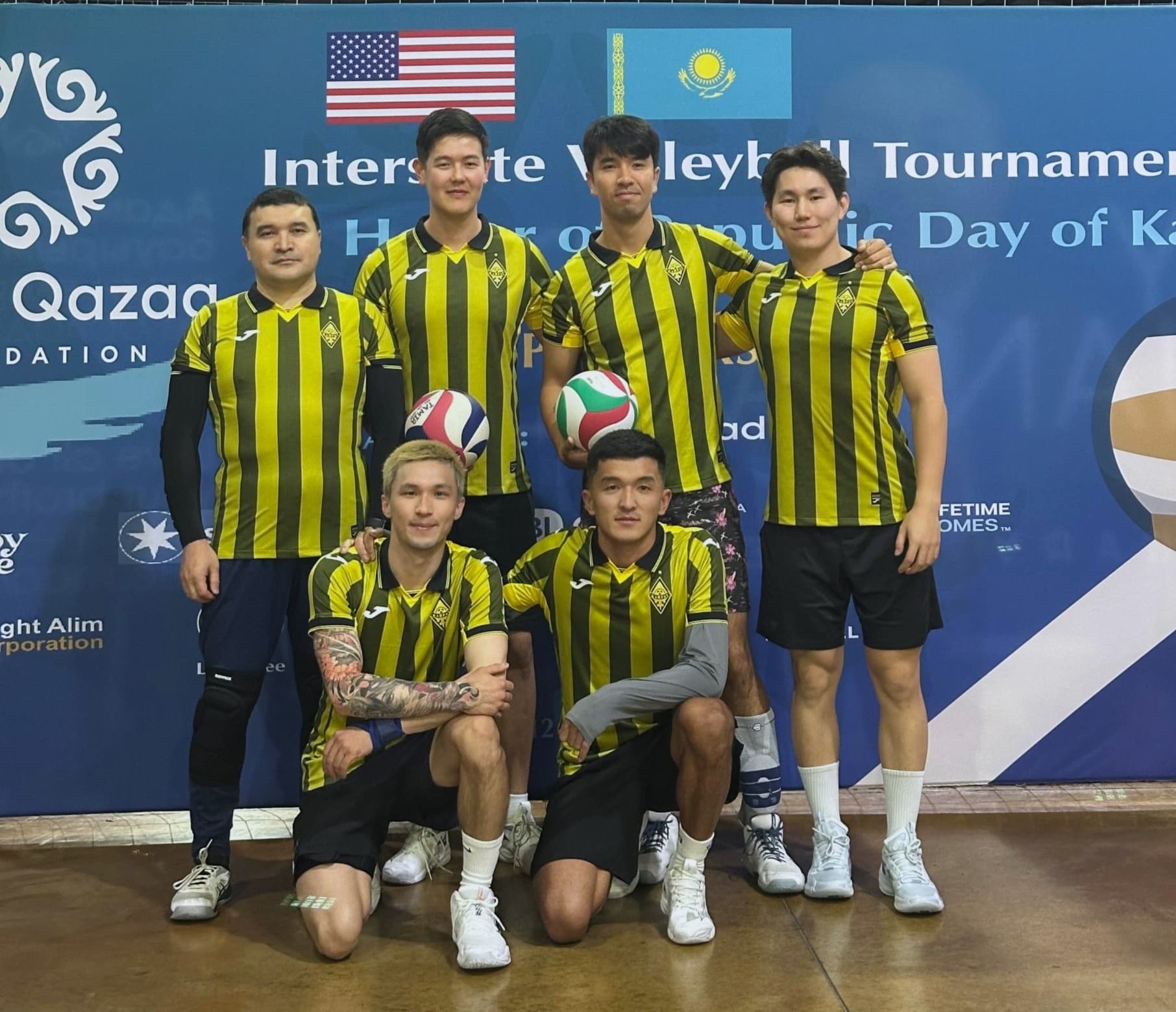We Came Together as Friends—and Became Champions
Golden Gate volleyball captain Olzhas Aitbekov reflects on victory, leadership and a new sense of possibility for Kazakh Americans.
.jpg&w=3840&q=100)
San Francisco-Bay Area resident Olzhas Aitbekov, after leading his team to victory at the Interstate Volleyball Tournament in Honor of the Republic Day of Kazakhstan, receives the tournament’s MVP award and first-place award on behalf of his team, San Francisco Golden Gate. Photo: Texas Qazaq Foundation
After the San Francisco Golden Gate’s first place win at this year’s Interstate Volleyball Tournament in Honor of the Republic Day of Kazakhstan, on October 12, 2025, in Houston, Texas, and hosted by Texas Qazaq Foundation, team captain Olzhas Aitbekov sees volleyball as a catalyst for Kazakhs to connect, grow, and organize across states.
Following the San Francisco Golden Gate’s first-place finish at this year’s Interstate Volleyball Tournament in Honor of the Republic Day of Kazakhstan, held on October 12, 2025, in Houston, Texas, team captain Olzhas Aitbekov hopes his team’s success will carry beyond the court into the Kazakh community back home in the Bay Area.
The 29-year-old Google software engineer, originally from Taraz in southeastern Kazakhstan, has called the Bay Area home for the past eight years. He views the tournament as a catalyst—an event capable of galvanizing Kazakhs across the United States.
“The volleyball tournament was one of the first of its kind between Kazakh communities across the States,” he says. “It showed what’s possible.”
Edgu Bilig recently spoke with Aitbekov about his team’s preparation for the tournament, the experience of competition in Houston, and what the event means for him, his teammates and the growing Kazakh American community.
What was your first impression when you arrived in Houston and saw Kazakh teams from across the country?
The experience was amazing—it totally exceeded our expectations. We formed our team just a month before the tournament. All the guys are from the San Francisco Bay Area—friends who train and hang out together.
We booked our tickets, flew in on Friday evening, and from the moment we landed the hospitality was on another level. Everyone—the local people and the Kazakh community—was so welcoming.
You mentioned forming your team only weeks before the event. How did you prepare?
It was my first time being a captain, so I wanted to make sure everyone felt ready. Some of the guys didn’t have much tournament experience, so I booked a few courts in the Bay Area. We practiced four times—drills, games, just enjoying it.
When we got to Houston, we relaxed a bit, went to a steam-box sauna, met some other players like Sultan, and then the next day attended the gala dinner. Meeting all the teams and doing the pool drafts made it feel real—like, this is happening.
What does this victory mean to you personally?
I’ve always dreamt of playing in something like this—where Kazakhs from all over the U.S. come together through sport. I’ve been playing volleyball for six or seven years, and this win is something I’d imagined for a long time.
Seeing twelve teams from ten states, new faces, new skills—it was incredible. For me, as someone who loves the game, it was fascinating from start to finish.
And how has it affected the Kazakh community back home in the Bay Area?
We don’t have a very large Kazakh community in San Francisco, but now everyone is congratulating us. People saw the posts and photos on Instagram and started reaching out.
It’s given our community more visibility. Friends and families were cheering from home, and people are already talking about doing more tournaments—maybe soccer next time. When we came back, we met and talked for hours about every game and highlight.

San Francisco Golden Gate teammates pose for a photo after their first-place victory at the Interstate Volleyball Tournament. From left to right: Aisultan Kassenov, Rinat Ibrayev, Olzhas Aitbekov, Akimbek Ulanbekov, Akhat Suleimenov and Tamirlan Seidakhmetov. Not pictured: Bauzhan Amirzhanov. Photo courtesy of Olzhas Aitbekov
What was the toughest match of the tournament for your team?
Definitely the games against Houston. Our first match was against them, and we lost—it was a wake-up call. We’d heard they were strong, and I knew a few of their players from when they lived in California.
After that loss, I told the team, “Let’s come back stronger. Let’s prove ourselves.” We had six players plus one last-minute addition from Houston—a legend who made a big impact. When we met Houston again in the semifinals and beat them, it felt amazing.
Describe the moment you realized you were about to win it all.
The final against Irvine was unforgettable. We started down 0–5 and had to fight back point by point. The set went 24–24, 25–25, 26–26 until the golden point at 27.
It wasn’t easy, but we pulled through. That last rally, the noise, the cheering—it was incredible. All the emotions hit at once.
What do tournaments like this mean for Kazakh communities across the United States?
I really liked that people saw this not just as volleyball but as a chance to meet and network—to feel connected through something positive. Volleyball isn’t very common among Kazakhs, so seeing so many people excited about it was amazing.
It shows how our communities are changing—more organized, more confident, more active.
What would you like to see happen next?
I think this tournament sets an example. I’m already planning to meet with the Bay Area Kazakh community to share what we experienced—the hospitality, the organization, everything—and to encourage something similar locally.
My message is simple: keep organizing these tournaments—the more, the better. And for the players—keep practicing, keep learning, and have fun. There were so many talented young players in Houston. If each state builds even a small volleyball community, we’ll keep this momentum going.